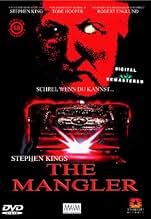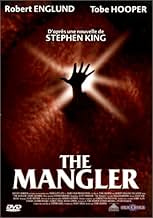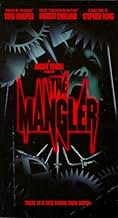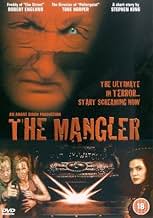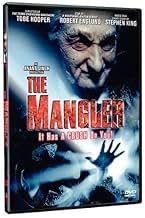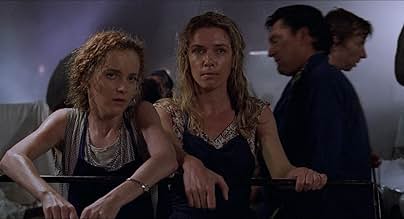A laundry-folding machine has been possessed by a demon, causing it to develop homicidal tendencies.A laundry-folding machine has been possessed by a demon, causing it to develop homicidal tendencies.A laundry-folding machine has been possessed by a demon, causing it to develop homicidal tendencies.
- Awards
- 1 win total
Featured reviews
This is a B-movie through and through. Terminally flawed, but, if you let yourself, you can have a lot of fun watching it. Levine and Englund are both over-the-top and captivating, the plot, script and score are simple and stupid, but in a way that renders them unimportant. Just invite some buds over, get some beer and laugh as Robert Englund hobbles around cursing, Ted Levine pops pills and the machine folds people like sheets. Don't get me wrong, it's really bad and, at times confusing. But, while Tobe Hooper may have dropped the ball on this, he never kicks it out of the court. If you're looking for stupid fun, this is pretty solid.
This movie rocked. It scared the heck out of me and I loved it.
A 3.0? Really? Have horror fans suddenly come down with a case of collective amnesia in the facts in the case of Tobe Hooper? The same director whose signature traits include a smattering of extreme gore garnished with dark humor? The man who made one of the most influential, landmark films of the 1970s ("The Texas Chainsaw Massacre")? I mean, granted, Hooper's career has been frustratingly inconsistent overall, but "The Mangler"--easily one of his most maligned works--is an unsung gem that suggests his tongue was planted firmly in cheek, but nobody really noticed. While the concept alone has "disaster" written all over it (a feature-film rendering of a Stephen King short story), what Hooper does with (and to) "The Mangler" is, really, what should have been done with "Graveyard Shift": he tears into the story with the veracity of a mental patient chewing the head off a rag-doll, elevating the absurdist elements to their breaking point, filling the film with (un)intentional humor to counteract the bloodletting, and fleshing out the characters and concept into a satisfying marriage of B-movie bliss. The plot? It's all about an anachronistic laundry facility where an ugly beast of a steam press starts folding the employees into bloody pulp; a pill-popping, chain-smoking local cop (Ted Levine) and his wiccan brother-in-law (Daniel Matmor) suspect foul play on the part of the disabled owner (Robert Englund, once again under a heavy latex mask), but the real reason is much more sinister (Hooper does succeed in making a compelling argument for the ridiculous explanation). While I haven't read King's short story, I will say that the script (by Hooper, Stephen Brooks, and Peter Welbeck) efficiently captures the quirky, small-town mannerisms of his characters, juxtaposed against evil spawned out of the banal territory of Everyday Life. While Hooper is unable to sustain the tricky balance between terror and dark humor that has made "Texas Chainsaw" so endearing, he ultimately transforms "The Mangler" into a sturdy, clean-burning B movie, buoyed by fantastic performances by Englund and especially Levine (who seems to be operating under the influence of a perpetual hangover).
I'm one of those who believe that Stephen King owes a very large debt of gratitude to H.P. Lovecraft (1890-1937.) In all fairness to King, though, he has graciously acknowledged Lovecraft's many important contributions to literary horror.
It's possible that director Tobe Hooper also recognized Lovecraft's significance when adapting The Mangler for the big screen. The short-story version does not offer a substantive historical link between the present-day and the genesis of the demon machine in the 1920s; the decade when Lovecraft began his short but illustrious writing career. Hooper took great pains, however, to develop an atmosphere that evokes the New England of Lovecraft's youth; a period when mill towns offered the only refuge for immigrants and native poor unable to make a living off the land. It was a time before the New Deal social reforms of President Franklin Roosevelt offered some relief from the exploitative and dangerous conditions inflicted on America's working class. For me, the philosophical sub-text of The Mangler is the evils of unbridled, industrial capitalism. The fact that rural communities have often depended for their very existence on a dehumanizing local industry is not lost on the socially progressive King.
Some have characterized The Mangler as an outstanding B-movie. I prefer to regard it as an all around entertaining flick. Although such films tend to be formulaic, Hooper and co-screenwriter Stephen David Brooks deserve credit for fleshing-out King's short story in a laudable fashion. The film's characters are well developed, and Robert Englund's portrayal of Bill Gartley, the grotesquely maimed, delightfully evil owner of the laundry machine from hell, should have earned him an Oscar nomination for Best Supporting Actor (a nod that should also have gone to Fred Gwynne for his fine work in Pet Sematary.) Ted Levine, and the versatile Jeremy Crutchley -- who portrayed two different characters in The Mangler -- also turned in noteworthy performances. Last but not least, the film's surprise ending, totally different from the climax of the original short story, is satisfying and appropriate.
Despite the overwhelming popularity of his novels, I believe that King's lesser works best demonstrate his creative gifts. The short story format demands an economy of words and a disciplined approach that can result in high emotional impact for readers. Short stories also provide additional latitude for movie makers to offer their unique interpretation of the work. The film adaptation of The Mangler is a fine example of the creative synergy between literary and cinematic artists, and a must-see for horror fans.
It's possible that director Tobe Hooper also recognized Lovecraft's significance when adapting The Mangler for the big screen. The short-story version does not offer a substantive historical link between the present-day and the genesis of the demon machine in the 1920s; the decade when Lovecraft began his short but illustrious writing career. Hooper took great pains, however, to develop an atmosphere that evokes the New England of Lovecraft's youth; a period when mill towns offered the only refuge for immigrants and native poor unable to make a living off the land. It was a time before the New Deal social reforms of President Franklin Roosevelt offered some relief from the exploitative and dangerous conditions inflicted on America's working class. For me, the philosophical sub-text of The Mangler is the evils of unbridled, industrial capitalism. The fact that rural communities have often depended for their very existence on a dehumanizing local industry is not lost on the socially progressive King.
Some have characterized The Mangler as an outstanding B-movie. I prefer to regard it as an all around entertaining flick. Although such films tend to be formulaic, Hooper and co-screenwriter Stephen David Brooks deserve credit for fleshing-out King's short story in a laudable fashion. The film's characters are well developed, and Robert Englund's portrayal of Bill Gartley, the grotesquely maimed, delightfully evil owner of the laundry machine from hell, should have earned him an Oscar nomination for Best Supporting Actor (a nod that should also have gone to Fred Gwynne for his fine work in Pet Sematary.) Ted Levine, and the versatile Jeremy Crutchley -- who portrayed two different characters in The Mangler -- also turned in noteworthy performances. Last but not least, the film's surprise ending, totally different from the climax of the original short story, is satisfying and appropriate.
Despite the overwhelming popularity of his novels, I believe that King's lesser works best demonstrate his creative gifts. The short story format demands an economy of words and a disciplined approach that can result in high emotional impact for readers. Short stories also provide additional latitude for movie makers to offer their unique interpretation of the work. The film adaptation of The Mangler is a fine example of the creative synergy between literary and cinematic artists, and a must-see for horror fans.
Its not great but still entertaining when you don't know what to watch. I saw what i wanted to see, there are movies that tease you with "horror" but never show real juicy things, for example the movie "its alive" is about that baby creature but they never show us the baby, but this one did just enough. The only small problem i had was the characters are a bit cartoonish like the way robert englund's character speaks sounds too fake, we are far from freddy for sure. Besides all that, the story is entertaining because freak accidents like that can happen in real life and it gives me chills.
Stephen King Movies Ranked by IMDb Rating
Stephen King Movies Ranked by IMDb Rating
See how IMDb users rank the feature films based on the work of Stephen King.
Did you know
- TriviaJim Cummings, the voice of iconic characters such as Winnie the Pooh, Tigger, Darkwing Duck, Pete, Ed the Hyena, Ray the Firefly, Hondo Ohnaka, Dr. Robotnik and a variety of other animated characters, provided the vocal effects for the titular machine and was glad to get to work with director Tobe Hooper, whom he was a fan of, but felt that the strain put on his throat by making the Mangler noises and the quality of the film itself wasn't worth the effort. He once saw the film on television and was amused to see that his name was misspelled as 'Tim Cummings' in the end credits, as it meant that he got paid to do a bad film and no one would even know he had been involved.
- GoofsMark incorrectly refers to a time in New England when witches were burned. This was actually a death sentence during medieval times in Europe, when someone was convicted of witchcraft. Colonial witch trials carried out the death sentence by hanging.
- Quotes
Mark Jackson: Whats in this?
Officer John Hunton: I don't know, they're antacids, I got them from Mrs. Frawley.
Mark Jackson: [looking at ingredients on antacid bottle] Belladonna? You got these from Mrs. Frawley?
Officer John Hunton: The Hand of Glory?
Mark Jackson: I think... we may be fucked.
- Alternate versionsAvailable in an R-rated version and an Unrated "director's cut". The unrated version contains very graphic versions of scenes, including Mrs. Frawley's and Gartley's deaths.
- ConnectionsFeatured in The Adventures of Sebastian Cole (1998)
Details
Box office
- Gross US & Canada
- $1,781,383
- Opening weekend US & Canada
- $933,809
- Mar 5, 1995
- Gross worldwide
- $1,781,383
- Runtime1 hour 46 minutes
- Color
- Sound mix
- Aspect ratio
- 1.85 : 1
Contribute to this page
Suggest an edit or add missing content




